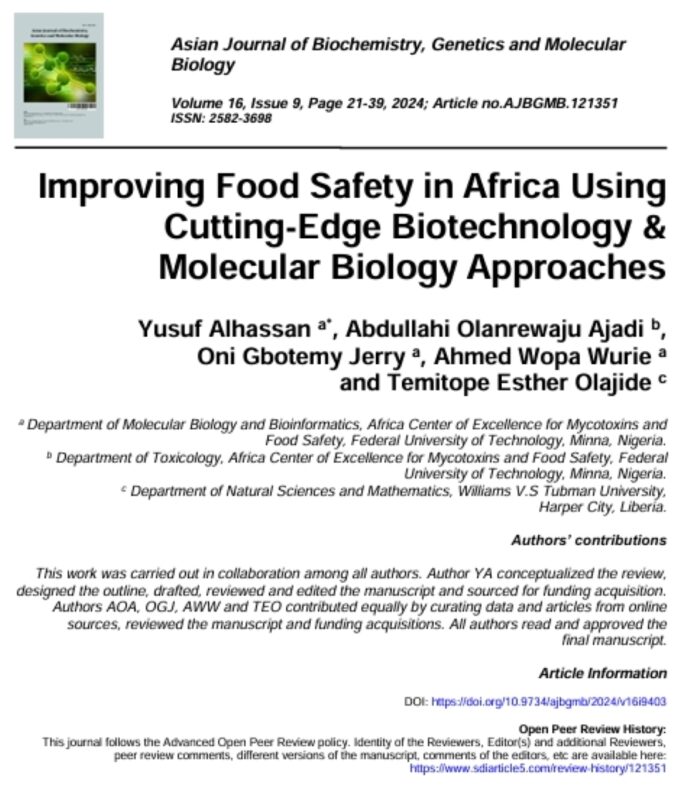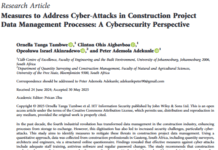 October 2024: Paper of the Month by Alhassan et al., 2024-Enhancing Food Safety in Africa: How Biotechnology & Molecular Biology Are Revolutionizing Contaminant Detection and Food Processing
October 2024: Paper of the Month by Alhassan et al., 2024-Enhancing Food Safety in Africa: How Biotechnology & Molecular Biology Are Revolutionizing Contaminant Detection and Food Processing
A recent study by Alhassan et al. (2024) titled “Improving Food Safety in Africa Using Cutting-Edge Biotechnology & Molecular Biology Approaches” published in the Asian Journal of Biochemistry, Genetics, and Molecular Biology, shows that advanced biotechnology and molecular biology techniques, such as whole genome sequencing and CRISPR systems, can enhance food safety by rapidly detecting contaminants and improving food processing.
“
Advanced biotechnology techniques, like whole genome sequencing and CRISPR, can significantly improve food safety in Africa.– Alhassan et al. 2024
The article highlights the significant health and economic challenges posed by foodborne diseases and African contamination, affecting millions annually. It explores advanced biotechnology and molecular biology approaches, such as whole genome sequencing, CRISPR systems, and foodomics, to enhance food safety through rapid detection of contaminants and improved food processing. Integrating these cutting-edge techniques can mitigate risks associated with foodborne pathogens, reduce post-harvest losses, and ensure safe, nutritious food production.
How the Study was Conducted
The authors curated data and articles from online sources to gather relevant information on food safety in Africa. The study utilized advanced molecular biology techniques such as whole genome sequencing (WGS), next-generation sequencing (NGS), foodomics, and CRISPR systems to detect foodborne pathogens and contaminants. The work was carried out in collaboration among all authors, with contributions to data curation, manuscript review, and funding acquisition. The study involved reviewing existing literature and analyzing the potential of biotechnological methods to improve food safety and processing in Africa.
What the Authors Found
The author found that Africa faces significant challenges with foodborne diseases, contributing to numerous health and economic issues. In addition, advanced biotechnology and molecular biology techniques, such as whole genome sequencing and CRISPR systems, can enhance food safety by rapidly detecting contaminants and improving food processing.
Why is this important?
Health Impact: Foodborne diseases are a major health concern in Africa, causing numerous illnesses and deaths. By using advanced biotechnology and molecular biology techniques, the study aims to reduce the prevalence of these diseases.
Economic Benefits: Food contamination leads to substantial economic losses due to healthcare costs and reduced productivity. Improving food safety can help mitigate these losses and boost the economy.
Global Standards: Aligning Africa’s food safety practices with global standards ensures that food products are safe for consumption and can be traded internationally, enhancing market opportunities.
Innovation and Technology: The study promotes the use of cutting-edge technologies like whole genome sequencing and CRISPR systems, which can revolutionize food safety practices and lead to more efficient and effective solutions.
Sustainability: Reducing post-harvest losses and ensuring the production of safe, nutritious food contributes to food security and sustainability, which are critical for the well-being of the population.
What the Authors Recommend
- The authors emphasize the need for widespread adoption of biotechnology and molecular biology techniques, such as whole genome sequencing, next-generation sequencing, foodomics, and CRISPR systems, to enhance the detection and control of foodborne pathogens.
- The authors suggest investing in training and capacity building for local scientists and food safety professionals to effectively use these advanced technologies.
- Strengthening policy and regulatory frameworks to support the implementation of these technologies and ensure compliance with global food safety standards.
- Furthermore, it encourages collaboration between governments, research institutions, and the private sector to foster innovation and share best practices in food safety.
- In addition, the study emphasizes raising public awareness about food safety issues and the benefits of using advanced technologies to ensure safe and nutritious food.
In conclusion, the study by Alhassan et al. highlights the transformative potential of advanced biotechnology and molecular biology techniques in improving food safety across Africa. By leveraging tools like whole genome sequencing, CRISPR systems, and foodomics, the continent can not only address the significant health and economic challenges posed by foodborne diseases but also align with global standards and enhance food security. To fully realize these benefits, investments in training, innovation, regulatory support, and public awareness are essential, fostering a safer, more sustainable food production system for the future.
















 The African Research (AR) Index is a comprehensive scholarly directory and database focused explicitly on journal publishers that publish and disseminate African research.
The African Research (AR) Index is a comprehensive scholarly directory and database focused explicitly on journal publishers that publish and disseminate African research.

